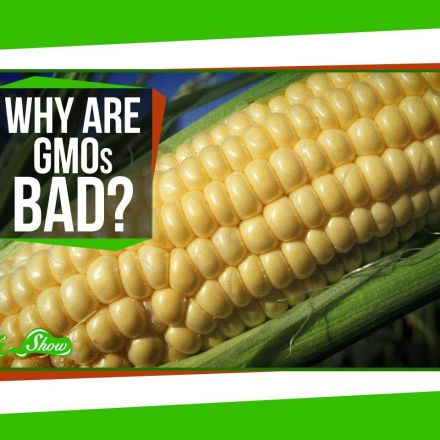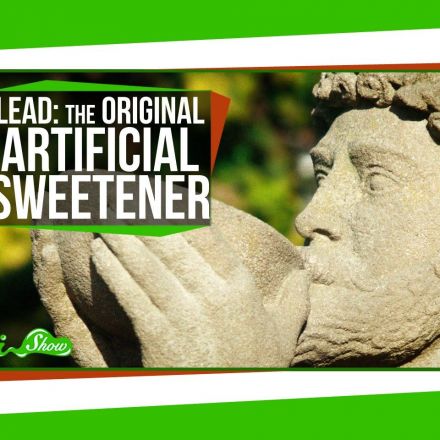Why are GMOs Bad?
Why are GMOs bad? They aren’t. They just aren’t, not intrinsically, and certainly not for your health. We’ve been eating them for decades with no ill effects, which makes sense, because a genetically modified organism is simply an organism, like every other organism, produces hundreds of thousands of proteins, but one or two of them are proteins that were chosen specifically by humans.
Additional Contributions:





























Join the Discussion
I would still like the right to be told what is in my food. That's all I want, it won't keep from eating GMO's, I just want to know exactly what is in my food, is it a regular corn or a GMO corn? Is that too much to ask for? Why do companies hate this so much they lobby to block it, it can't cost a lot of money to print a small GMO inside label on the packaging.
All corn is GMO corn. Its original wild ancestor isn't even edible. We've been genetically modifying corn for over 9000 years.
I feel like it's either a bit disingenuous, or just pedantic to say that. We all know that we're discussing genetically engineered rather than selectively bred, and to act as if there is zero difference between the two is just inaccurate.
Yes, "GMO" is a vague and ambiguous terminology, but we all know what we're talking about here, let's be honest.
Whichever technique is used to produce the strain, the result is the same. The only difference with GMOs is that we get the result a lot quicker. It's like saying that books written on a computer (instead of a typewriter) should have a special label on them.
There is a slight difference between genetically modifying and simply selective breeding. Off the top of my head, there's corn genetically modified to produce pesticides. That wouldn't be possible through selective breeding no matter how many generations we bred. Another example is splicing fish genes into some plants to increase tolerance to cold (I believe?). So, I can kind of see FistfulOfStars point.
Perhaps, but there are plenty of plants that produce pesticides without GMO tech, so I don't think you can say that definitively. For example, caffeine is a pesticide.
As is nicotine.
My point isn't that the result of GE is different, but that the method is different, and I felt like your original corn anecdote glibly dismissed that difference, when that difference itself is the subject at hand.
I personally think it should be like kosher certification or hormone-free labeling... products can use 'GE Free' certification as a selling point, without requiring regulation at all. But I do think there is merit to both sides of this discussion, and neither side warrants belittling.
Well, we agree then. Companies can (and do) already label their food as "GMO free". What I'm against is mandatory labelling.
As for the method being different...yes, of course it is, but I wasn't aware that was controversial. AFAIK, nobody is claiming that GE is the same as selective breeding. The question is whether or not the GMOs are frankenfood that will give you cancer of the AIDS and make you grow an eye on your back.
Yes, and most tomatoes and beans have been grafted at some point which is a form of GMOing, that still doesn't negate the fact I wouldn't mind being told what's in my food. The same way they don't just say there is fat in my food, they break it down into Trans, Mono, etc...
Eating different types of fat can have health consequences, so having that information is relevant to you. There is no difference between a plant that was produced via GMO vs. selective breeding. So, unless you have some ethical reason for rejecting GMOs, having that information gives you zero benefit.
Companies are fighting to not be forced into it. Today they can optionally label their food as GMO. Chipotle has gotten a ton of press for it. What they're fighting is to be required to introduce a label that their is little to no evidence to support health benefits for. Keep in mind, regulation typically helps large companies. They're able to spend the money for compliance that small business aren't.
Excellent point!
I'm not saying that I disagree with you, but I'm going to play devil's advocate for a minute. Consider the recent trends in food labeling like "organic" or "gluten-free". If two foods have similar price and one says "organic", you are likely to buy the "organic" version. Likewise, while only a very small percentage of the population actually needs gluten-free foods for nutritional reasons, the gluten-free label has become synonymous with "healthy" for much of the general public and the consumer effect is similar. So imagine that you are a food company that uses GMOs in their products (hint: this is MOST food companies). If GMO is considered "unhealthy" you probably don't want the label on your products. And like /u/ChelsG mentioned above:
One good reason to dislike GMOs is their potential to damage our agricultural industry: http://www.foodlawfirm.com/2013/06/the-legal-consequences-of-gmo-crop-drift/
Sorry, I just can't see GMO labeling and the possible image backlash being such a huge blocker for these large food companies. How many times have these companies switched around the sentiments of the population with their use of "creative" marketing? That's not a barrier at all.
I think part of it may be, and I admit that I am speculating here, that all of our foods contain GMOs. At least all processed foods and most raw plants as well.
There's also the complication of whether we label genetically modified foods, genetically engineered foods, or both. Because I would argue that all beef is GMO because the cows have been bred for specific traits that make better steaks. Artificial selection is essentially genetic modification by a slightly different method.
I also acknowledge that my opinion on this issue is unpopular. I am totally ok with agreeing to disagree!
For me, the difference between selective breeding and genetic engineering is the time frame.
Selective breeding gives us time to see how well our process is doing. It gives time to the organism and to us to adapt to the changes being introduced. It gives time for the ecosystem to integrate the modified organism.
Genetic engineering is a shortcut, a fastforward to what we want. While the effects are apparent since they are targeted for, we don't really know how well these organisms will integrate into the existing ecosystem. We will only know once it's out there and, should the effects be catastrophic, back-pedalling won't be easy - if it is possible.
As someone else already pointed out, we all know there's a difference between selecting for better traits, and engineering something "better". The difference is clear even from the term itself: Genetically Modified Organism
Whether there's a difference is not a matter of opinion, but of fact. Disagreement is irrelevant.
I'm uneducated on the topic of GMOs and selective breeding. Can you point me to a scientific reference that defines the two terms?
I doubt you're being honest, but your Google is just as good as mine. Surely you see a difference between choosing and modifying?
We could argue semantics until we are both blue in the face. I'll leave you with some facts
Classical vs. Transgenic breeding
Genetic modification explained
World Health Organization: FAQ about GMOs Check out #3 - GMOs are more rigorously tested than traditional foods.
Equating selection with modification certainly keeps popping up in these pro-GMO articles, even though it's obviously dishonest. With one way, there is no modification, with the other, there is. Is "yes" equal to "no"?
Why is that dishonest? Can you explain how it's better to selectively breed for a trait instead of just inserting that trait into the DNA? The result is the same.
Do you need to read my post again? Here's a relevant quote:
The point was that there's a difference between modifying something and choosing something, and therefore it's dishonest to equate the two (like pro-GMO articles keep doing).
Is that clear now? :p
Yes, of course the techniques are different, but the result is the same (as I said before). If I write a book with a word processor, is it dishonest to claim that I could've written the same book with a typewriter?
Well, I'll just settle for making my own claim against yours: The results are not the same. There. I guess that's settled then.
First, it's rude to publicly call someone a liar. Especially when responding to a two sentence request for more information. This is the time to educate people, not be jerk.
Second, I'm perfectly capable of using Google. In fact, when I typed in "gmo vs selective breeding" I saw the following in the top ten results:
- Partisan article
- Q&A with no scientific citation
- Partisan article from PBS titled Harvest of Fear
- Partisan article promoting a book titled Seeds of Deception
- An article explaining the topic who includes in the first paragraph the statement "I'm not an expert."
- Partisan article (from an organic farm)
- Hey, a Q&A site with a peer-reviewed article! (behind a paywall)
- A 2002 scientific article that may or may not be peer reviewed.
I don't see anything from a peer-reviewed journal. Since, as I stated I'm uneducated on the topic of GMOs and selective breeding, I was hoping someone could provide some actual scientific insight. Since you're here, on a public forum, speaking out on the topic, I assumed that someone was you. So once again...
I'm uneducated on the topic of GMOs and selective breeding. Can you point me to a scientific reference that defines the two terms? What processes are used to create GMOs? Is the grafting of plants a GMO? Does it involve irradiation to induce mutation? Are scientists injecting DNA from one organism into the cells of another? Are they cloning plants? If so, how?
Edit: Oh look, @melanoleuca posted a good link (http://www.sciencemediacentre.co.nz/2008/09/19/genetic-modification-explained/) which actually contains references!
[This comment was removed]
Are you thinking in terms of modifying an individual organism? I ask because the GMO issue concerns to modifications made to a species, breed, or strain, which can be accomplished by either selective breeding or genetic engineering. That's what hallucinogenia seems to have in mind.
Again, choosing something is not the same as modifying something.
The first link doesn't work. We all know that modification involves changing something (directly). Choosing a good specimen for breeding does not change anything directly. There's a difference, but they're equated by pro-GMO articles (and you). I won't repeat this again.
Good thing I didn't, then? :) I merely stated that I doubted you were being honest.
It's dishonest to accuse people of things they haven't done (when you can see that they haven't)!
Why would you make that assumption?
Anyway, no one needs to be an expert to see that there's a difference between selective breeding and modifying genes, but the two are equated by pro-GMO articles, which shows that they're dishonest. That's enough for me. If it's not enough for you, I'm afraid I can't help you.
I've already addressed (parts of) that.
The choosing pertains to individual organisms or genes. The modifications are the results of those choices and pertain to an entire strain or breed of organism that will carry the desired trait through future generations. Dogs are a good example: humans selected individual wolves and bred them, and the result was a variety of modified wolves such as huskies, golden retrievers, and Australian shepherds.
You're muddying up the definition of "modification". Even if you insist on using it in the sense of "modification by selection", there's still a difference between that and "modification by direct change".
Compare:
That difference only exists in the first generation of the new type of organism. The subsequent generations, which are the ones raised for food, raw materials, or other purposes, will all start life with the modifications regardless of the methods used. If your new BMW could have children, they'd have leather seats right from the start either way.
Alright, so you finally conceded there's a difference. Good.
But the results are the same, which was the whole point of this discussion. The individual modified plants that actually become food are neither selected nor directly altered in a lab. They are grown from seeds that were harvested from other modified plants.
No, the whole point was that GMOs are bad :)
Can we please just stop already?
GMOs are only bad if they cause harm, and that needs to be evaluated on a case-by-case basis. Genetic engineering is just a set of techniques that can be used to create new organisms, both good and bad. Are metalworking techniques bad because they can produce swords and guns, or good because they can produce medical tools? Are metal tools bad because a few of them (e.g. swords) are weapons?
You really insist on making the last word here pro-GMO?
I'd rather make it closer to neutral. The greatest harm I've heard of resulting from GMOs has been economic, due to suspended trade with Japan after some stray GMO wheat was found in a field in Oregon. But that problem was caused by Japan's belief that GMOs are bad, not by any known health risks. My personal opinion on GMOs is "proceed with caution."
Wow.. :D Very sophistry. Such disgust. So it's bad to think that GMOs are bad because that results in economic harm? That makes no sense. Obviously Japan was prepared to do without GMO crops - otherwise they wouldn't have banned them.
Look, you're a pro-GMO shill. That's been reasonably clear for a while now. Maybe you've been instructed to always get in the last word, and to make it pro-GMO. I'm not sure what to do here. I can't make you stop posting, but I don't want to keep playing these games either.
No. The point of the example was that GMOs are sometimes bad, even if they aren't inherently bad. It would be stupid for farmers who sell crops to Japan to plant GM crops.
No. I'm just a person whose opinion on the matter differs from yours. No one has offered or given me any incentive whatsoever to hold or express a specific opinion on GMOs.
This whole thing started as an attempt to explain how selective breeding is a form of genetic modification in the sense that it can create a new subspecies or other type of new variant. The point of all that is that genetic modification is not inherently bad. If you eat anything that was grown or raised on a farm (with only a handful of possible exceptions such as farmed salmon), you're eating something that has been modified from the original wild organism. The interesting differences that set genetic engineering apart from other methods are the range and extent of possible modifications and human issues such as intellectual property laws. Neither is a necessary part of genetic engineering--it can be used to accomplish modifications identical to those made through selective breeding, and scientists or corporations can choose not to try to make a new GMO crop proprietary--but they are a reality we have to acknowledge. GMOs can be extremely bad, but they don't have to be.
I hope I've explained my position well enough here to convince you that I'm not fully for or against GMOs. You can have the last word now if you'd like.
Really? So all the corporations have to do is sprinkle some magic marketing dust and suddenly everybody loves GMOs? If it was that easy, why haven't they done it already?
Are they not doing it right now? And marketing is not magic, it's a well studied science by now. People go to school for it, lobby for it, get rich from it. It's been proven effective time and time again. I don't know how anyone can dismiss the power of marketing in this day and age.
Where did I dismiss it? I'm aware that marketing works. What I disagree with is the idea that you can solve any problem just by throwing some money at marketing. That's the idea of "marketing as magic": if you just pour enough money into a marketing campaign, you're guaranteed success.
Well, there's no 100% guarantee but a properly well-funded marketing campaign (traditional media ads, internet campaigns, professional talking heads, online "experts" generously spread across online forums, etc.) would probably have around 99.99999999% chance of success. It's been done before, I don't see how it can't be done again.
Those kinds of campaigns fail all the time, though. Look at elections. Two well-funded marketing campaigns go head-to-head; one of them fails. The anti-GMO campaign has several years' head start and is already ingrained in the public consciousness. Good luck overturning that.
The differences there is "well-funded". The reality of it is, the more you can pay, the bigger your voice. The anti-GMO campaign is grassroots at best. There's no huge company backing them. When large GMO companies like Monsanto do it - and they ARE doing it - they do it "well-funded". They are already starting to turn public perception with their campaign - which include forums like these, I might add!
Also note that the law currently stands WITH the GMO companies. They are well protected and entrenched there. They're already at a position of advantage!
Heh...so I guess they're just biding their time? Is that it? Not a very wise strategy, it seems, but okay. I'm very skeptical that the anti-GMO campaign is not well-funded. Organics is big business now, and what better way to increase sales than by convincing consumers that your rivals' food is poison? I wouldn't go so far as to say Monsanto is the underdog here, but it is a far from advantageous position for them. Public opinion is hugely against them right now, and that matters a lot.
I agree with that, I only want to know for curiosities sake and because I think I should be allowed to know, maybe a website where they tell you would be acceptable?, I just don't see myself no longer eating cereal, beans or meats because of the label, but I do like Organic foods. I can see how labels can be used in a stupid fashion, especially with that Gluten thing.
Sure! And I also want to know what is in the food I eat. I just think that the corporations are fighting it not because of some huge scary conspiracy, but simply because they are watching their bottom lines.
If people knowing your products contain GMOs is bad for your business, then maybe you shouldn't be putting GMOs into your products?
So like, if you're poisoning your customers, you probably don't want to let them know you're doing it? That would be bad for business.
It's not about perception - it's about the truth, and the actively-suppressed truth is that GMO's are harmful to us. See my other comment for sources: http://snapzu.com/rti9/why-are-gmos-bad/comments/57770
Yes! Thanks, this is exactly it! Just give us the information! Why the need to hide GMO? That only gives it a more sinister vibe.
[This comment was removed]
Please stop spreading propaganda.
Yes they're bad. But Monsanto's profits are more important than our .. not-dying.
GMO Myths busted: https://www.youtube.com/watch?v=ptDd9ftNaq8
Genetic Fallacy: How Monsanto Silences Scientific Dissent: https://www.youtube.com/watch?v=ShJTcIlTna0
These rats were fed GMO's, and now they're full of tumours: http://i.imgur.com/K8O9tmn.png -- That study was quickly silenced: http://naturalsociety.com/hotly-debated-study-gmo-republished-1240-scientists-will-supressed/
After reading trough this comment thread. I'd like to add something. Everybody here at snapzu is allowed his her or her opinion and they are most certainly allowed to back this up with his or her sources and start a healthy discourse on the matter at hand however we do expect this discourse to progress in a respectful manner. Please try and remain civil about things.
Quite a lot of things are not matters of opinion. Whether GMOs are "bad" or not is one of them. They either do have harmful effects on humans or they don't.
I haven't even called him names. I have pointed out his dishonesty though, which I think is fair, considering he is dishonest (as I've shown).
It seems to me you're calling for Political Correctness. Don't you think that PC is counter-productive to figuring out the truth of whatever is being discussed?
It is very much a matter of opinion in this case depending who's camp you reside in . Also this is more a call for Civility then Political Correctness
People have opinions about it, but that doesn't mean that whether GMOs are harmful is a matter of opinion.
For example, I could have the opinion that 2 + 2 equals 5, but whether it actually does is not a matter of opinion.
I have been civil.
[This comment was removed]
You say that right before posting a bunch of propaganda.
[This comment was removed]
How is what I posted propaganda?
The other definitions say pretty much the same thing.
Wikipedia has a much more accurate definition, that differentiates between merely spreading information and doing so dishonestly and with an agenda:
For some highly mysterious reason, you didn't want to go with that. Oh, and it seems your claim that "the other definitions" say the same thing is obviously false, what with the most widely used source for definitions saying something different and all.
By now it's obvious you're being intellectually dishonest, so you might want to take that claim back.
[This comment was removed]
Sophistry has that effect on me (and any other honest person).
[This comment was removed]
Are you this strict with him too?
As with any controversial issue, there will be propaganda spread by both extreme viewpoints. The reality is most likely somewhere in between. The "suppressed study" you linked was suppressed because of faulty methods and the fact that it could not be replicated. This doesn't make it a conspiracy, its just bad science. Trust me, if there were serious issues with GMOs, the larger scientific community would be talking about it - and they're not.
Common GMO claims debunked
Merely accusing them of "faulty methods" invalidates the results, right?
Right off the bat, they're equating genetic modification with choosing good specimens, which is just plain dishonest.
.. Except for the suppressed Seralini study, for example. Or quite a lot of other scientists: http://www.endsciencecensorship.org/en/page/Statement#signed-by
In other words, the claim that there is a scientific consensus is a flat out lie. Does that speak well for GMOs?
But the FDA can't be trusted: http://www.slate.com/articles/health_and_scie...nd_scientific_misconduct_are_hidden_from.html
Why would the FDA be looking out for our interests over Monsanto's, especially considering that a former Monsanto vice president is calling the shots there: http://politicalblindspot.com/former-monsanto-vice-president-running-fda/ .. ?
I'll stop here, because this should be enough for any intellectually honest person to conclude that at the very least GMOs can't be considered safe.
I havent read to all the links you posted so I wont comment on that. However, you do realise that any protein (and a number of other things) that is foreign can promote an immune response, right? That's the reason we get allergies after all. Sometimes it just happens that lymphocytes attack stuff they should not.
I'm not sure how that's related to the question of whether GMOs are bad.
Well, you quoted this
I clarified that this happens all over the place and therefore is pretty much useless to determine wether GMOs are bad or not. It's just fearmongering. I could just as well go out and start blaming free range eggs for provoking allergies. The fact that a certain food is a GMO does not relate in any way to wether or not it's immunoactive.
I've already done enough here.
[This comment was removed]
GMOs are like any technology. They can be good or bad. Saying they are not intrinsically bad is meaningless. It is relatively easy to create a GM food crop which is poisonous.
What is bad about them is ownership of living things. Patenting GMOs creates huge motivations for companies which taint the science, just like our current pharmaceutical regimes. When a lot of money is at stake you can't trust the testing any more. When huge companies lobby governments to remove them of the burden of testing safety properly or applying pressure to allow them, we can't trust them any more.
Exactly. Look at a list of recalled pharmaceuticals. They were all once considered "safe and effective". The list of not-so-safe-anymore artificial sweeteners is another symptom of the same type of "R&D" process. "But the only thing we changed was..." doesn't replace thorough testing. I'm not interested in a public Beta with things that I put in my body.
Where I live in Oregon GMO crops have been banned. You can get some pretty big fines if you're a farmer. And a few farmers got screwed over on their crop for this year.
I'm not terribly concerned about GMOs. We've been "modifying" crops since Crag the Caveman picked the juicy orange over the shriveled tasteless ones. What does concern me is the lack of genetic diversity and how pesticides/herbicides might affect health and development.
For all those who aren't from the United States
GMO
A genetically modified organism (GMO), also known as a transgenic organism, is any organism whose genetic material has been altered using genetic engineering techniques. GMOs are the source of genetically modified foods and are also widely used in scientific research and to produce goods other than food.
There are a few people I would like to share this video with. Many people dislike GMOs for the wrong reasons.
I've spent a bit of time discussing this issue with folks in this thread and I realize that it may appear that I am totally in favor of GMOs. I'd like to clarify my stance, if I could. I think GMOs are incredibly detrimental and dangerous, but not because of health risks to humans. The danger comes from the potential environmental impacts like the dangers of monoculture, gene transmission to non-GMO species, and the very idea of patenting living things. I encourage everyone who is researching this issue to consider the values and potential bias of source material. As I said in another post, any controversial issue will spawn propaganda from both extreme viewpoints. Reality is almost always found somewhere in the middle. Good hunting!
I think the danger of GMO isn't what it is now. It is what it will be in the future and the current trend now does not bode well for the future. The resistance to transparency, the patenting and the litigious nature of its most powerful proponent - these all indicate this the "humanitarian" side of GMO is nothing but an afterthought or a marketing gimmick.
That's not a problem with GMOs themselves, though. That's a problem with the regulatory and legal system. Unfortunately, patent reform and such is too esoteric for most people. It's much easier to whip up fear about "poisoned frankenfood". Back in the 80s-90s, it was preservatives, food dyes, and MSG. Now, it's GMOs and gluten. In a decade or two, it'll be something else equally stupid.
Yes, GMO themselves are not inherently bad, that's a given. Technology and innovation is neither bad nor good. But you cannot separate those issues from GMOs right now given that most of the groups involved the development of GMOs are deeply invested in these issues.